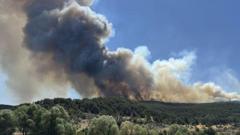How Did Ten Workers Lose Their Lives Fighting Turkey's Wildfires?

Understanding the Impact of Wildfires in Turkey: A Tragic Incident in Eskisehir
In recent weeks, Turkey has been grappling with devastating wildfires that have claimed the lives of at least ten forestry and rescue workers in Eskisehir province. The situation has not only raised alarms about the dangers faced by those on the front lines of firefighting but also highlighted the escalating challenges posed by climate change and extreme weather conditions. The tragic loss of these brave individuals is a stark reminder of the sacrifices made to protect both people and nature.
The wildfires in the Seyitgazi district began on a seemingly ordinary Tuesday morning but quickly escalated into a life-threatening crisis. As winds shifted unexpectedly, 24 forest workers and volunteer rescue personnel found themselves trapped within the advancing flames. This incident reminds us of the unpredictable nature of wildfires and the inherent risks faced by those who combat them.
The Human Cost of Wildfires
The tragedy in Eskisehir saw five forestry workers and five volunteers from the AKUT rescue organization perish while attempting to control the blaze. In addition to the fatalities, 14 forest workers were hospitalized, underscoring the physical and emotional toll these events take on individuals and communities. Turkish President Recep Tayyip Erdogan expressed his condolences on social media, acknowledging the bravery of those who lost their lives in the line of duty.
Nebi Hatipoglu, a local lawmaker, articulated the profound grief felt within the community. The loss of these "heroic forest workers" reflects not only a personal tragedy but also a broader societal challenge in dealing with the rising frequency and intensity of wildfires. As climate change continues to alter weather patterns, the risk of wildfires has increased significantly, raising questions about preparedness and response strategies.
The Escalating Wildfire Crisis in Turkey
Turkey is experiencing a severe wildfire crisis this summer, with fires reported in multiple regions, including Sakarya, Bilecik, İzmir, Karabuk, and Manisa. The soaring temperatures, exceeding 40 degrees Celsius (104 degrees Fahrenheit), have created ideal conditions for wildfires to ignite and spread. The current situation has forced tens of thousands of people to evacuate their homes, further straining local resources and emergency services.
Wildfire Management and Prevention Strategies
As the frequency of wildfires increases, it is crucial for governments and organizations to implement effective wildfire management and prevention strategies. Some key approaches include:
- Enhanced Monitoring: Utilizing technology such as satellite imagery and drones can help monitor fire-prone areas and detect wildfires in their early stages.
- Community Education: Raising awareness about fire safety and prevention is vital. Communities should be informed about risks and safety measures to take during wildfire season.
- Resource Allocation: Ensuring that firefighting resources, such as personnel and equipment, are adequate and strategically positioned can significantly improve response times.
- Forest Management: Implementing sustainable forest management practices can reduce the fuel load in forests, thereby decreasing the likelihood of catastrophic wildfires.
The Role of Organizations like AKUT
The AKUT Search and Rescue Association is a non-governmental organization dedicated to disaster search and rescue relief. Their efforts in responding to emergencies like wildfires are invaluable. However, the recent tragedy highlights the need for enhanced support and resources for such organizations. By investing in training, equipment, and mental health support for rescue personnel, we can better prepare them for the challenges they face.
Climate Change and Its Implications on Wildfires
The link between climate change and the increasing frequency of wildfires cannot be overstated. As global temperatures rise, regions that were previously less susceptible to wildfires are becoming more vulnerable. Factors contributing to this trend include:
- Drier Conditions: Higher temperatures lead to drier vegetation, which serves as fuel for wildfires.
- Extended Fire Seasons: Warmer winters and earlier springs can prolong the fire season, increasing the likelihood of wildfires.
- Increased Lightning Strikes: Climate change has been linked to an increase in the number of lightning strikes, which can ignite wildfires.
Responding to Wildfires: What Can Be Done?
Addressing the challenges posed by wildfires requires a multi-faceted approach that involves government, community, and individual efforts. Some actionable steps include:
- Policy Change: Governments should enact and enforce stricter land use and forest management policies to mitigate wildfire risks.
- Investment in Research: Funding research into climate change impacts and effective wildfire management can lead to better preparedness.
- Community Resilience: Empowering communities to develop their own emergency plans can enhance local resilience to wildfires.
The Psychological Impact of Wildfires
Beyond the physical destruction caused by wildfires, there is a significant psychological impact on affected individuals and communities. Survivors may experience trauma, anxiety, and depression as a result of their experiences. Furthermore, the loss of homes, livelihoods, and loved ones can create long-lasting emotional scars. Addressing mental health needs in the aftermath of wildfires is essential for community recovery.
FAQs
What causes wildfires in Turkey?
Wildfires in Turkey can be caused by natural factors like lightning strikes, but human activities, such as discarded cigarettes, campfires, and arson, significantly contribute to their occurrence.
How can communities prepare for wildfires?
Communities can prepare for wildfires by creating emergency plans, conducting fire drills, and educating residents about fire safety measures and evacuation routes.
What steps can be taken to prevent wildfires?
Prevention strategies include maintaining defensible space around properties, practicing safe outdoor burning, and reporting suspicious activities that could lead to wildfires.
What should I do if a wildfire approaches?
If a wildfire approaches your area, follow local evacuation orders, gather essential belongings, and have a plan in place for where to go. Stay informed through local news and emergency services.
The tragic events in Eskisehir serve as a poignant reminder of the dangers posed by wildfires and the heroism of those who battle them. As climate change continues to exacerbate these conditions, it is imperative that we come together as a society to find solutions, support those affected, and honor the sacrifices made by our brave firefighters and rescue workers. What actions do you think we can take to better prepare for and respond to the growing threat of wildfires? #Wildfires #ClimateChange #FireSafety
Published: 2025-07-23 19:49:15 | Category: technology



